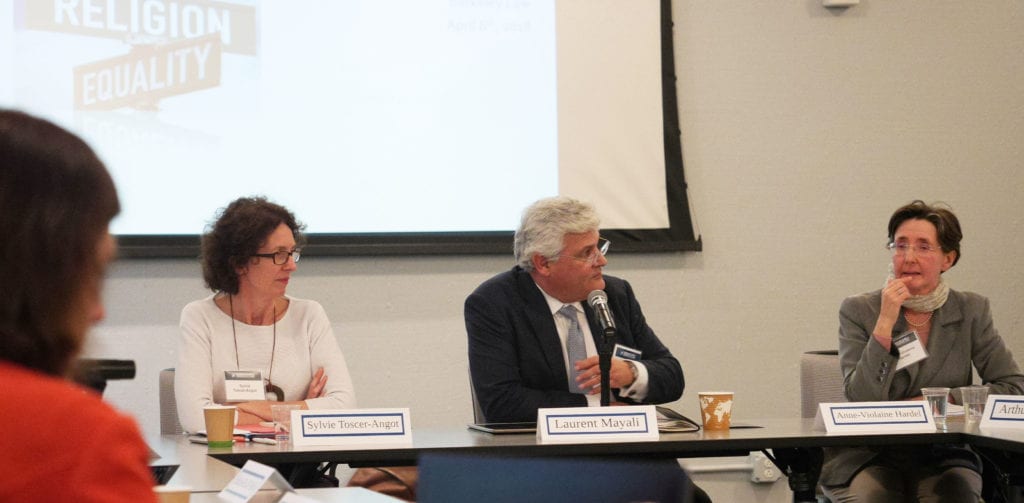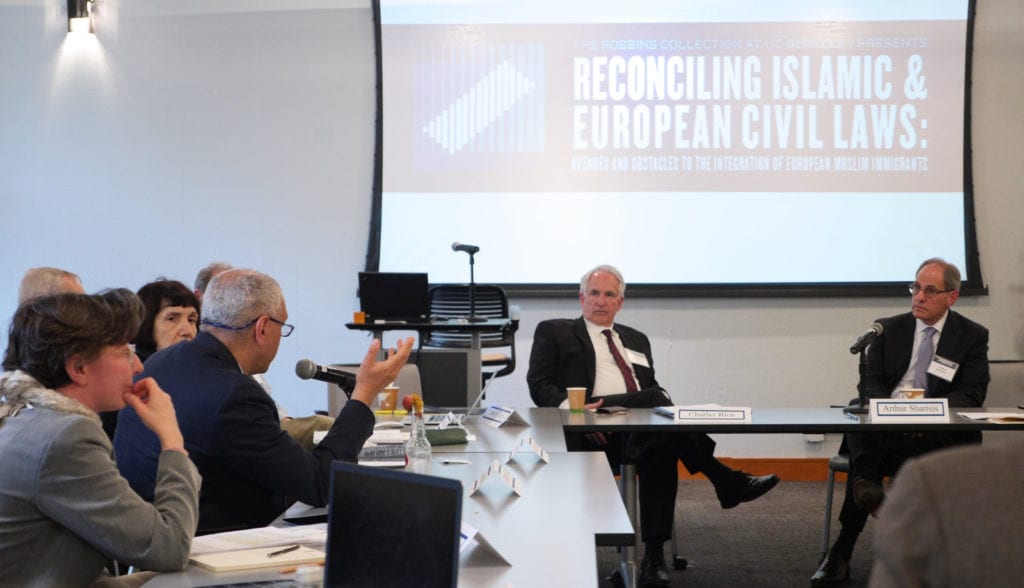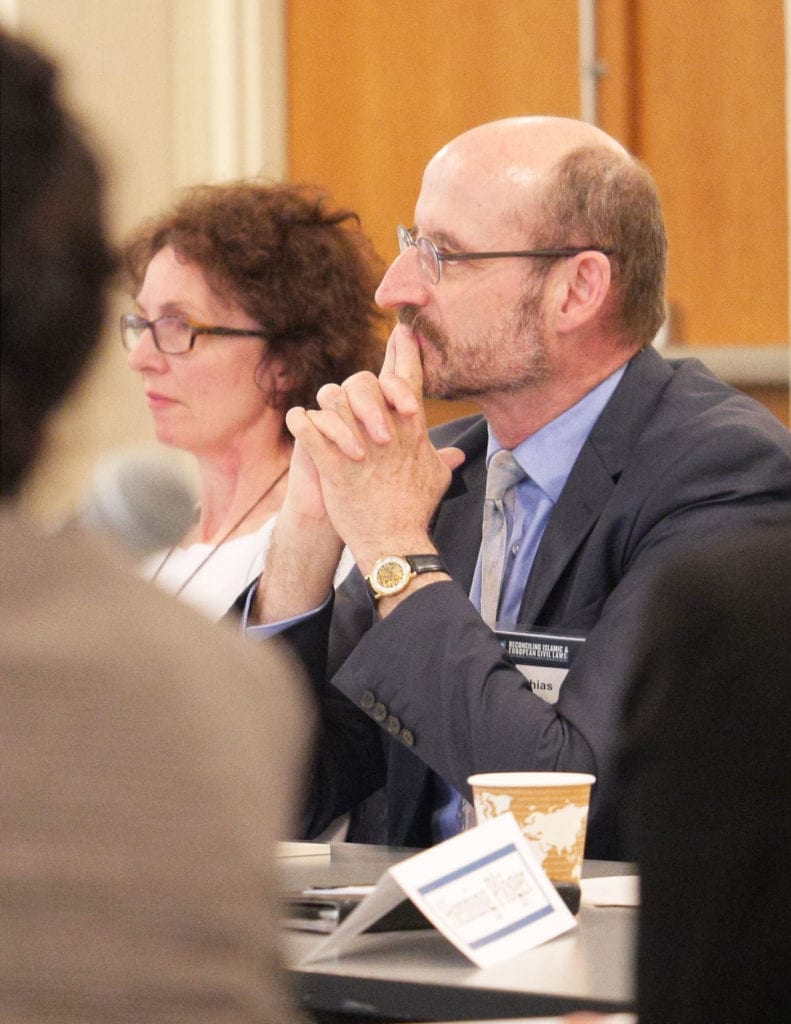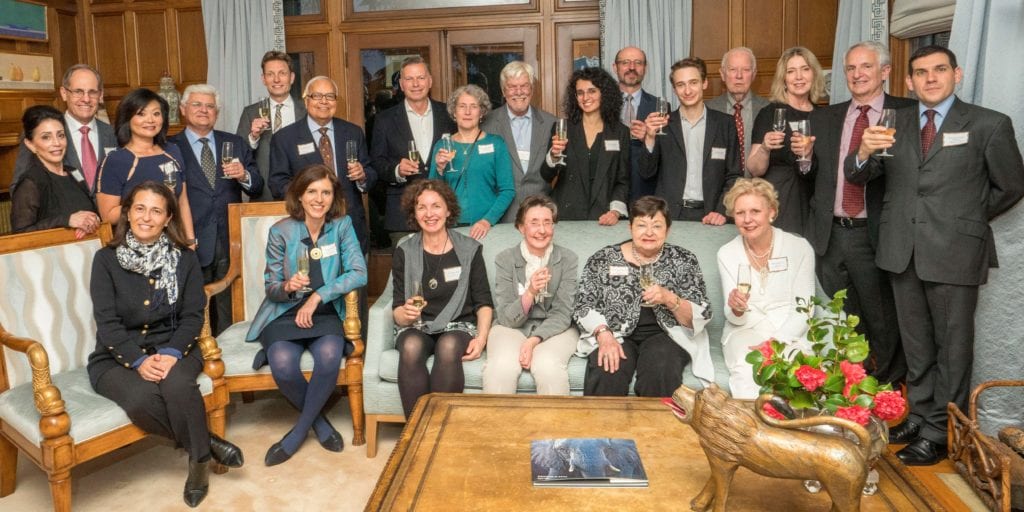Avenues and Obstacles to the Integration of European Muslim Immigrants
The influx of Muslim immigrants to European countries like France and Germany over the past several decades continues to influence the pluralism of the population’s cultural and religious identities. The Muslim population in Europe reached an estimated 4.9% in 2016—an estimation that is projected to grow in the next several years with the rise of Muslim refugees seeking asylum.* How are the legal differences between Islamic law and the predominant system of European Civil Law reconciled to ensure that all religious, cultural, and minority groups are recognized and accommodated? This issue, and its tangential lines of conflict, were the focus of the recent conference, “Reconciling Islamic and European Civil Laws: Avenues and Obstacles to the Integration of European Muslim Immigrants.” Sponsored by the Robbins Collection and organized by Berkeley Law Professors Laurent Mayali and Charles Rice, the event took place at Berkeley Law on April 6th and 7th and brought together leading scholars from Europe, Canada and the United States whose work examines the intersection of Islamic Law and European Civil Law.

Over the course of two-days, the conference participants presented papers and participated in discussion that covered topics such as, the development of Muslim jurisprudence in countries where Muslims are a minority, the areas in which Islamic Law and European Civil Law conflict, practices that mitigate conflicts between these two legal systems, and the issues that arise when Islamic councils use sharia law for private disputes in European countries. The presence of international participants from countries such as France and Germany widened perspectives on these issues and promoted comparative discussions. Farida Belkacem, a PhD candidate at the European University Institute and visiting researcher at Berkeley who participated in the roundtable said the conference “contributes to a better understanding of the multiple challenges faced by Muslim communities in the West….There are huge differences between the way Muslim communities are perceived and portrayed throughout the West and the way they live de facto.”
Charles Rice ’80, an attorney for Shartsis Friese, LLP and Lecturer at Berkeley Law, served as the moderator for the first three sessions. Jeremy Gunn, Professor of Law and Political Science at the Université Internationale de Rabat, Morocco began the presentation of papers with “Islam and the Concept of the Separation of Religion and the State.” Mr. Gunn examined the combination of religion and state in Islamic countries as a means to sanctify the political control of religion. Mr. Gunn’s presentation was followed by Emmanuel Tawil, an Associate Professor at the Université Paris 2 Panthéon-Assas, and Henning Plöger, Director of the Division for Basic Rights of Germany’s Federal Ministry of Justice and Consumer Protection.

Blandine Chelini-Pont, Professor of History, Law, and Religion at Aix-Marseille Université turned the attention from continental Europe to Great Britain in her presentation, “How to Appraise the Current ‘Sharia Courts’ System in Great Britain.” In her argument, Ms. Chelini-Pont configured Great Britain as an example of a pluralistic legal system that is confrming to its growing multiculturalism. Turning the attention back to France and Germany, Arthur Shartsis ’72, a Partner at Shartsis Friese, LLP, presented “Immigrant Integration in France and Germany.” Mr. Shartsis conducted ground surveys in France and Germany with immigrants, politicians, and government officials to ascertain varied perceptions on the issue of immigrant integration.
On Friday, the final two presentations critically appraised how France and Germany recognize Islam in school systems and the right to wear religious symbols such as headscarves. Anne-Violaine Hardel, Chief Legal Counsel for the Bishops’ Conference of France, traced the history of France’s 2004 decision to ban religious symbols in public schools against the backdrop of French laïcité, the principle of separation of church and state. Université Paris-Est Créteil Professor Sylvie Toscer-Angot discussed the institutional recognition of Islam in German state schools and the effect that restrictions have on the personal freedom of Muslim individuals. Though the discussion during both presentations criticized the policies for banning religious symbols in schools, a salient thread running through much of the conference was the possibility of education as a solution and means to achieve integration of Islamic Law with European Civil Law.
“Being a Muslim and having lived in France for six years, I witnessed behind the scenes how challenging and sometimes conflicting Islamic and European laws can be. Islam’s place in the European legal system needs to be addressed.” -L.L.M. Student Anas Benmalek
The conference was open to the Berkeley Law community and among those in the audience were two Berkeley Law L.L.M. candidates with questions and discussion moderated by Berkeley Law Professor Laurent Mayali. Chiraz Zribi was born and raised in Tunisia and studied in France before attending Berkeley Law. Ms. Zribi said, “I am not sure that such a free and open debate could’ve taken place in France given the sensitivity and the political dimension of the issue.” Ms. Zribi considered the issues to be aligned with her personal experience as a university student in France, “back then, in Europe, the question of Islam and whether it is compatible with the values of the western countries was in the heart of every political debate. This conference was the opportunity for me to explore these issues more deeply.” Anas Ben Malek, a Berkeley Law L.L.M. candidate, also studied at a university in France. Mr. Malek, a Moroccan native, asked the roundtable of participants to consider the complications that arise when religious symbols like headscarves are banned at the university level and the effect it has on adult students. Mr. Ben Malek later said, “being a Muslim and having lived in France for six years, I witnessed behind the scenes how challenging and sometimes conflicting Islamic and European laws can be. Islam’s place in the European legal system needs to be addressed.”

Day two’s presentations explored applications of Islamic legal norms in Europe and reconciling Islamic family law with European public order. The sessions were moderated by Laurent Mayali and Arthur Shartsis. “Islamic Family Law and Ordre Public in Continental Europe,” presented by Andrea Büchler, Chair for Private and Comparative Law at the University of Zurich’s Law Institute, analyzed the entanglement of sharia-based family law for Islamic populations amidst Europe’s own complicated history with family law. She touched on Europe’s adherence to lex patriae, which considers the choice of law for many family law issues to be determined by the nationality of the persons concerned. Throughout the conference Mohammad Fadel, Associate Professor of Law at the University of Toronto Faculty of Law, challenged many arguments that were based in a European perspective and was able to provide an Islamic-centered perspective on a number of issues. His presentation, “Islamic Family Law, Private International Law, and European Public Order” spoke more to the Islamic perspective with regard to the issue of entangling Islamic family law within the context of liberal jurisdictions. Mr. Fadel detailed the Islamic norms in family law proceedings in contrast with European liberal policies to ultimately support a system of pluralism in family law arbitration.

Baber Johansen, Professor of Islamic Religious Studies at Harvard Divinity School, presented, “Marriage and Filiation in Islamic and European Law,” a paper not far removed from his teaching at Harvard Divinity School. Mr. Johansen considered religious affiliation, kinship, social status, and gender as factors that determine the legality of marriage and filiation, as well as the consequences of contemporary fertility practices such as surrogacy. The final presentation of the conference came from Mathias Rohe, Chair of Civil Law, International Private Law, and Comparative Law, and Founding Director of the Erlangen Center for Islam and Law in Europe at Germany’s Friedrich-Alexander-Universität Erlangen-Nürnberg. Mr. Rohe’s academic work focuses on the legal status of Islam in Germany of Europe, and the development of Islam into a European context. His presentation looked at the informal application of legal norms in Germany and examined the scope and limits of such applications. The Robbins Collection expects to publish several papers by the end of summer as a compendium of the ideas and solutions presented by the conference participants.
